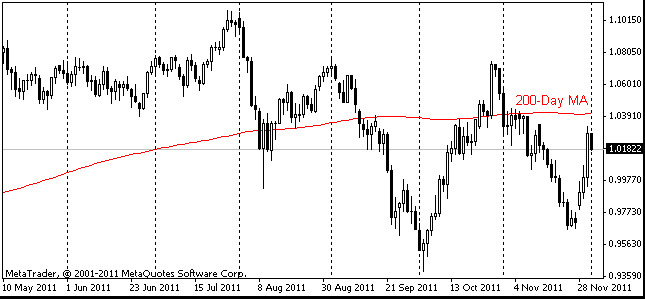EUR/usd
Despite the obvious improvement in the general news background, the single currency faced sales in the second half of the day yesterday. Formally it was not without reason. But the newly elected Greek government still needs to show its will to take further austerity measures. The expectations that Germany would take a less tough stance under the pressure of other G20 leaders also didn't manage to develop into something tangible yesterday. While formerly the markets got disappointed in the results of the EU summits, now they get disappointed with the summits held by the leaders of the most influential countries of the world. However, the dollar hasn't managed to appreciate not only against the euro, but also against most risk-sensitive currencies. eurusd remains in a slightly upward trend. It's very likely that before the release of the Fed's decision, which is scheduled for tomorrow evening, the market will hardly venture to storm the 1.25 and 1.30 levels. However, the positive dynamics of the stock exchanges shows that the negative of May has already faded away. Just as in the previous few years the market participants more tend to buy on the dips, seeking out attractive assets. Frankly speaking, the current behaviour of the central bankers gives the world much food for thought. The RBA has decided to abstain from any extreme measures, the BOE has delayed another round of QE at least for a month, the Reserve Bank of India has surprised with its inactivity, the Banks of Japan, Canada and New Zealand haven't taken any measures either. All that happened between the summits of the G20 Finance Ministers and CB heads and the leaders of these countries. It seems that they still feel certain that the euro zone will preserve its integrity and also tend to curb the capital outflow into the relatively safe dollars and yens. Of course, to some extent all this resembles a kind of the conspiracy theory, but we should bear in mind that the rates are now very high and the politicians are least of all interested in the fast capital movements among the countries and large fluctuations of the currency rates.

GBP/USD
Just like the euro the sterling abstained from storming important levels. Yesterday morning the British pound reached the average annual level of 1.5730 and then dropped below 1.57, where it remains now. Yesterday Rightmove published the House Price Index, which indicated that the prices set by the sellers have grown by 1% in June and by 2.4% against the rate reported in June 2011. It is a favourable result for the housing market. Today we look forward to the minimal increase in the consumer prices and the same 3.0% rate of inflation. If the inflation proves to be a bit weaker, it will only play in the hands of the BOE and the government in general, but will hardly do any good to the sterling.

AUD/USD
About a couple of weeks ago the aussie was almost completely dismissed. Nevertheless it rose like Phoenix from its ashes breaking above the parity and setting a record above 1.0130. The support at 0.9650 proved to be rather strong, having withstood for the third time in the year. If we rely on the historic data, the Aussie has the potential to appreciate above 1.07, especially if the RBA suddenly stops cutting the rates.

gold
Just like the Aussie, Gold bounced off the support line for the third time in the year (this time off 1530$). The previous two times the currency's strength failed it on the way to 1800$ (the strong resistance at 1790$). There is a feeling that the bullish sentiment in the stock exchanges will soon spill over into steady purchases of risky assets.
